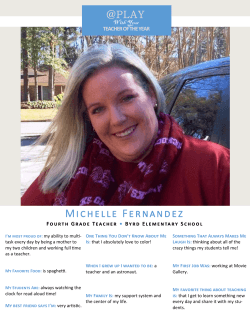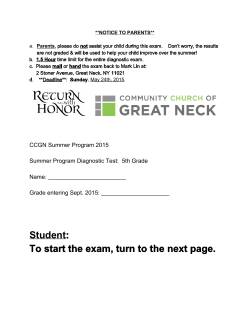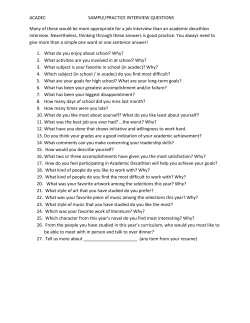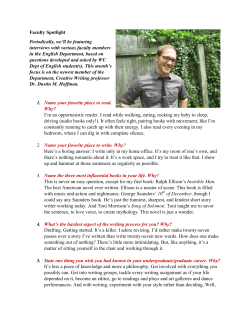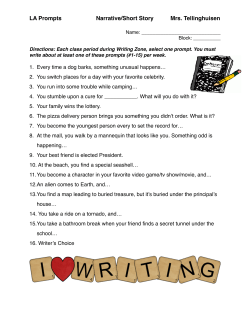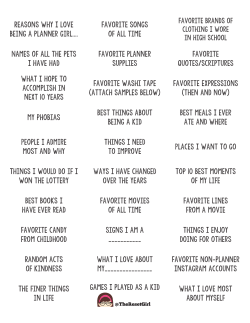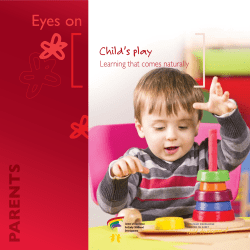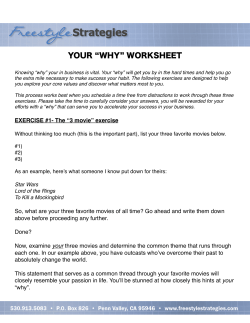
Learning to read and write
Learning to read and write Learning to read and write is an exciting adventure for a young child. This adventure can begin in infancy and last a lifetime. As children learn that books are for reading — not chewing — and that pictures and words are different, they begin to lay the foundation for reading and writing. ■ Reading Stage one Exploring Although parents do not always enjoy it, touching, tasting, and even occasional tearing are favorite activities for infants and toddlers as they first discover books. It is never too early to show books or read to your child. Read to infants and toddlers and provide opportunities for them to explore written material. Snuggling up in a comfortable lap while listening to a story sets the stage for a lifelong love of books and learning. Parents also might buy toddler “board books” -- books with pages made of heavy cardboard. Parents also can allow children to play with old magazines. Stage two an understanding of connected events. As children discover that stories have a beginning, middle, and an end, they learn to memorize and retell stories with amazing accuracy. During this stage children become particularly interested Repetition and anticipation As children grow older they begin to copy their parents or older siblings and “pretend to read.” They may ask parents to read a story over, and over, and over! Although parents may tire of the same book, children enjoy the repetition as they anticipate the chain of events. Repeatedly hearing the story also helps children develop PM 1529e Revised November 2003 in details; if parents skip over a sentence or paragraph in a book, children will protest quite loudly. Stage three Following along with a finger helps children learn that words are placed in sentences from left to right and in a certain order. Words as symbols for ideas Stage five During the third stage, children begin to develop a basic understanding that the pictures and words in their book have different purposes. Gradually, they understand that written words are symbols for ideas and thoughts. Focus on meaning Stage four Identifying and matching words In the fourth stage, children begin to identify and match words. Although they may not really understand the meaning of specific words or sentences, children often will run their fingers along the sentence or point to individual words as the book is read. In this final stage of development, children begin to focus on the meaning of words. They may stop the story repeatedly and ask “What does this say?” They begin to recognize simple words from their favorite books in other reading materials or places. The word “STOP” on a corner stop sign can cause great excitement. Reading, listening, and writing are important skills that parents can foster early in a child’s life. The following are some suggestions for parents to help their children in the fascinating world of words. • Establish a regular time every day for reading. Reading a story gives children a sense of what reading and writing are all about. • Get your child a library card and make regular visits to the library. Take advantage of story times and special events sponsored by your library. • Read to infants and toddlers. They learn to associate reading with the comfort and security of being held and with the wonderful sound of a parent’s voice. • Preschoolers enjoy hearing the same story over and over again. When reading books that repeat phrases, such as The House that Jack Built, give young children an opportunity to participate by letting them read the repetitive parts with you. • Preschoolers love to “pretend” to read by telling a favorite story they have memorized. Increase your child’s involvement by stopping occasionally to ask questions or talk about what is waiting for them at the turn of a page. Questions help children develop important language skills. Try “How many pigs are there? Let’s count them together,” “Why is the puppy dog sad?” “Can you show me everything in this picture that is red?” “What do you think will happen next?” • Encourage older children to read aloud to younger siblings, or to read aloud a dramatic piece from a play or a poem. Most children love to put on a good performance. • Help your child understand the structure of a book by making a “Me” book using a photo album. Collect pictures of family members, friends, favorite animals, toys, etc. Albums with sturdy pages are easy to keep clean and allow you to change pictures easily. You also can use snapshots, post cards, magazines, and catalog pictures. • Explain the joy and importance of reading regularly. Before children can become readers, they must learn why people read and what people do when they read. • Invite your children to help you read a recipe as you cook. Read cooking instructions out loud. Point out measurement markings on measuring cups and spoons. • Show your children how you must read and write when you pay bills. Let them open your junk mail and decide what is to be saved or tossed. Encourage younger children to use junk mail in pretend play. • Encourage older children to check the weather predictions and read movie commercials or comic strips in the newspaper. You also might want to help your child start a collection of newspaper and magazine stories about sports, nature, science, etc. • Provide alternative reading materials such as TV schedules, old catalogs, and magazines. When traveling, read out loud traffic signs, road signs, and billboards. Check with your local librarian for a list of magazines written specifically for children. • Record a favorite book on tape so that your child can read along. Older children frequently enjoy taping books as a gift for a younger child. • For more information, ask for Ages and Stages, PM 1530a-g, at your county extension office. ■ Writing When children write, they begin to focus on the details of written words. The following are some ideas to help you encourage your child’s writing skills. • Let your children make grocery lists and greeting card lists, record birthdays on the family calendar, and make charts for chores. • Let your child play with an old typewriter (provide a supply of typing paper). • Write notes to your child about chores and errands and don’t forget to include a thank you. Encourage them to write letters and thank you notes to friends and family members. Take dictation for a child who cannot write and read the letter back for the child’s approval. • Let children write with colored chalk on a sidewalk or basement floor. • Give gifts of pens, pencils, stationery, or a crossword puzzle book. • Suggest they write for free pamphlets and samples. Supply them with postcards and stamps. • Set up a message center at home and let children fill out phone memo pads. Encourage older children to write down messages about their whereabouts or school activities. • Buy a diary for older children (promise to respect their privacy). File: Family life 8 Written by Lesia Oesterreich, extension family life specialist. Edited by Carol Ouverson and Muktha Jost. Illustrations by Lonna Nachtigal. Graphic design by Valerie Dittmer King. ■ Read more about it! For more information about children and families, ask for the following publications from your county extension office. Kindergarten Ahead, PM-1529n Child’s Play - Art, PM 1770a (cost) Child’s Play - Fingerplays Plus, PM 1770b (cost) Child’s Play - Pretend Play, PM 1770c (cost) For additional publications, also check the ISU Extension Web site at www.extension.iastate.edu. Understanding Children: Language development, PM-1529f . . . and justice for all The U.S. Department of Agriculture (USDA) prohibits discrimination in all its programs and activities on the basis of race, color, national origin, gender, religion, age, disability, political beliefs, sexual orientation, and marital or family status. (Not all prohibited bases apply to all programs.) Many materials can be made available in alternative formats for ADA clients. To file a complaint of discrimination, write USDA, Office of Civil Rights, Room 326-W, Whitten Building, 14th and Independence Avenue, SW, Washington, DC 20250-9410 or call 202-7205964. Issued in furtherance of Cooperative Extension work, Acts of May 8 and June 30, 1914, in cooperation with the U.S. Department of Agriculture. Jack M. Payne, director, Cooperative Extension Service, Iowa State University of Science and Technology, Ames, Iowa.
© Copyright 2025
